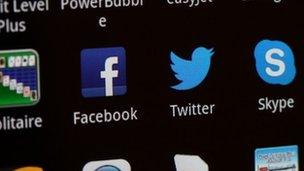Saudi Arabia blocks Viber messaging service
- Published

Social media has spread like wildfire in Saudi Arabia - it has the highest take-up of Twitter in the world
The head of the messaging application Viber has said people in Saudi Arabia have had basic freedoms taken away, after his service was blocked there.
Talmon Marco told the BBC he did not know the reason for the move, but that Viber would be restored soon.
In March Saudi authorities warned Viber and other encrypted messaging services that they would be blocked unless they provided a means to be monitored.
Mr Marco said he had refused to provide data requested by Saudi officials.
The fact that Viber's free phone and text messaging service is no longer working in the country is not entirely unexpected.
The Saudi telecoms regulator had warned the firm - along with Skype and Whatsapp - that they would be blocked if they did not agree to be monitored.
The warning prompted many Saudis and expatriates living in Saudi Arabia to protest against the move. Many also began to censor their messages, in case they were already being monitored.
Mr Marco told the BBC that Saudi internet service providers and mobile operators started asking for information about the internal workings of the service a couple of months ago.
"We assumed that the reason they wanted it was to try to figure out ways to tap into our conversations, listen to what our users are saying, read messages," he said.
"Not that understanding how the system worked would have have helped them - but we did not provide them with the data," he added.
Circumventing the problem
Mr Marco said Viber had faced similar moves to block it in Iran. There, he said he believed the motive was political, but in Saudi Arabia it was unclear whether commercial interests might also be at stake.
"What we do know is that our users are being disenfranchised, they are being denied access to basic communication," he said.
For now, neither Skype nor Whatsapp have been blocked in Saudi Arabia.
Mr Marco suggested that the block on Viber might be a first step against all three services or that the two others might already be monitored.
Saudis have taken up internet social networks with extraordinary enthusiasm - allowing them to communicate with each other with a freedom that they never had before.
Recent denunciations of Twitter by leading Saudi religious figures have heightened concern amongst the millions of Saudis who use such services that the authorities want to limit or close their access to such freedoms.
Millions of expatriate workers there also increasingly rely on free messaging services to stay in touch with their relatives, whom they may not see for years.
Both Saudis and expatriates in the country have reacted to the block on Viber with considerable apprehension.
But Mr Marco offered reassurance, saying that his company was already working on a way to get past the block.
He said that Viber's experience in Iran had given it valuable experience in dealing with the problem and he expected to have the first stage of a workaround ready within a couple of weeks.
- Published25 March 2013
- Published10 August 2010
- Published6 August 2010
- Published14 August 2012